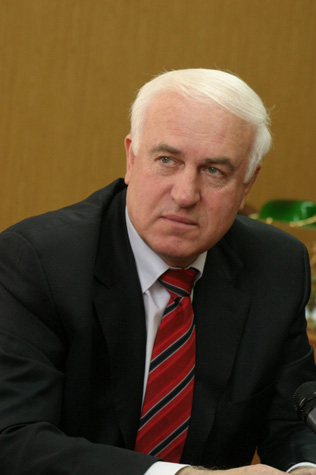Pustovoitenko, Valerii
Pustovoitenko, Valerii [Пустовойтенко, Валерій; Pustovojtenko, Valerij], b 23 February 1947 in Adamivka, Mykolaiv oblast. Government official, parliamentarian, and politician; seventh and up to then longest-serving prime minister of independent Ukraine. As prime minister, Pustovoitenko was also: co-chairman (July 1995–December 1997) of the presidential advisory council on personnel matters; a member of the directing bodies of the pro-presidential People’s Democratic party (from its inception in February 1996), and leader of the party from May 1999; co-chair of the Zlahoda association (from March 1999 on); member (from August 1997) of the Council for National Security and Defense; head of the interdepartmental council to co-ordinate activities relating to annual meetings of the European Bank for Reconstruction and Development (EBRD) in Ukraine (from October 1997); and (also from October 1997 to July 2000) head of the Coordinating Council on Matters of Judicial and Legal Reform attached to the president; and many other bodies. He graduated as a mechanical engineer in 1975 from the Dnipropetrovsk engineering institute (now the Dnipro State Academy of Civil-Engineering and Architecture), and later (1996) obtained a candidate’s degree in the same field. Beginning work in industry at age 14, he eventually became a chief engineer of a major engineering enterprise in Dnipropetrovsk, and then its director. In August 1986, he was appointed head of a raion government executive committee, from which position he was promoted in October 1987 to deputy head of the Dnipropetrovsk city council, becoming its head in October 1989.
In March 1990, Pustovoitenko was elected a deputy to the Supreme Soviet of the Ukrainian SSR from a Dnipropetrovsk oblast constituency and served on the parliamentary commission on construction matters. At the same time, he was also head of the Dnipropetrovsk city council from March 1991 to April 1993. He was then appointed minister of the Cabinet of Ministers of Ukraine, or de facto deputy prime minister, a position of considerable influence acting as gatekeeper for work and information flowing to all of the ministers. In July 1997, he was appointed prime minister. As expected, unlike his several predecessors, he remained loyal to President Leonid Kuchma and had no troublesome personal ambitions. His leadership style was steady and bureaucratic; he was a reluctant reformer. During his term as prime minister Pustovoitenko was briefly involved in the directorship of a financial-credit union called Ekspobank. His name was first on the list of the People’s Democratic party (NDP) in the 1998 elections to the Supreme Council of Ukraine, but he withdrew to resume the office of prime minister. He attracted attention to the country’s desperate economic situation by threatening to lock the doors on a meeting of businessmen until their taxes were paid. In the aftermath of the 1999 presidential election, he resigned on 30 November, as required by the constitution, to clear the way for a new government. Pustovoitenko was promptly proposed for re-appointment as prime minister by President Kuchma, but failed on 14 December to be approved by parliament. He was succeeded as prime minister by Viktor Yushchenko, whose administration he did not refrain from criticizing.
Pustovoitenko was among four candidates considered in May 2001 for prime minister, of whom Anatolii Kinakh was appointed, whereupon Pustovoitenko became transport minister. The People’s Democratic party under Pustovoitenko’s leadership was one of the original building blocks of the pro-presidential electoral alliance, For a United Ukraine, in the 2002 elections. As number six on the bloc’s list, Pustovoitenko took leave to campaign and, having been elected to parliament, on 30 April was released as minister. When the bloc split up in June 2002, Pustovoitenko’s NDP caucus contained 18 deputies; by January 2004, it was down to the minimum of 14. As the fractions in the Supreme Council rearranged themselves over the next two years or so, Pustovoitenko’s CV followed: co-head of the NDP and PPPU, May–December 2004; member, combined fraction of Labor (Toiling) Ukraine and NDP, December 2004–April 2005; leader, NDP fraction and the Respublika group, February–April 2005; unaffiliated, April–September 2005; and co-head of the NDP fraction and Labor Ukraine Party, September–October 2005. Throughout this time, from June 2002, he was chair of the parliamentary committee on construction, transportation, communal economy, and communications. In the March 2006 elections, he was a candidate for the Supreme Council of Ukraine from the NDP Bloc, no. 2 on the list, which received less than 0.5 per cent of the vote. He was replaced as leader by Liudmyla Suprun.
In 2017, Pustovoitenko was one of five former prime ministers invited to a celebration of the 100th anniversary of Ukrainian government (counting as its starting point the 28 June 1917 creation of the General Secretariat of the Central Rada), but who did not attend. Pustovoitenko was also President of the Football Federation of Ukraine from 1996 to 2001.
Bohdan Harasymiw
[This article was written in 2020.]
